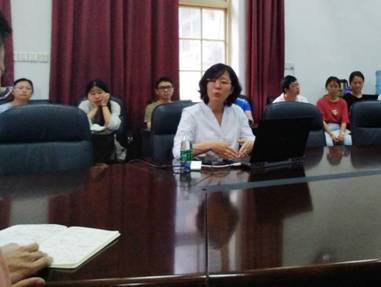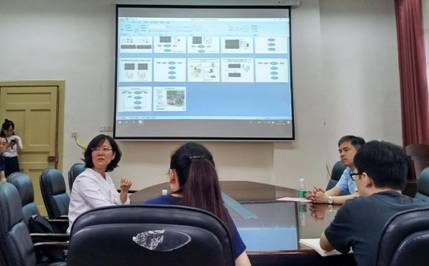Dr. Kun Ling, a professor of Mayo Clinic in USA, was invited to our school to give an academic talk in the conference room on the 3rdfloor of the 5thWest China Teaching Building at 10 AM on July 16th.In such a rainy day, many teachers and students, from our or other schools, attended the talk with enthusiasm. The dean of our school, Prof. Canhua Huang, warmly welcomed Prof. Ling and introduced her to all audience before the talk. The talk was entitled “Role of A Ciliary Phosphoinositide Pathway in the Context of Autosomal Dominant Polycystic Kidney Disease”.
Prof. Ling is currently an associate professor at the Department of Biochemistry and Molecular Biology at the Mayo Clinic in the United States. Prof. Ling and her team are focusing on the roles of phosphoinositide signaling, especially the type I phosphatidylinositol phosphate kinases, in cell adhesion, migration and primary cilia-mediated cell communication, as well as related human diseases. She has been in charge of several research programs funded by Association American Heart, American Cancer Society, Komen Breast Cancer Foundation, National Cancer Institute, etc. She also has published many high-level academic papers in well-known international journals, such as PNAS, Nature, and J Cell Biol, etc.
Prof. Ling started the talk with some background knowledge of the polycystic kidney disease (PKD).PKD is one of the most common autosomal dominant genetic disorders, whose disease onsetmainly begins in the early adulthood. Several related genes with disease-causing mutation have been found, such as polycyst in 1/2 (PKD1/2), which encode 2transmembrane proteins, and GANAB gene, which encodes an enzyme to glycosylate PKD1/2. The key link underlying the pathogenesis of PKD is the abnormality ofPKD1/2-dependent signal transmission, which could affect the production and function of the cilia.

Then, Prof. Ling shared one of their recent findings about the impact of phosphoinositide signaling pathway on PKD1/2 genes and PKD pathogenesis. They discovered the relationship between PKD protein expression levels and the pathogenesis and progression of PKD throughin vitro3D cell culture and mouse embryo. In addition, they demonstrated that kinases PIPKI-γ and NPP5E could regulatePKD2 signal through their substrate (PI-4,5-P2). They also found that DIg5 and Exo70 could function as effect molecules of PI-4,5-P2, and HSP90 could function as a regulatory molecule of PIPK-γ. In the future, Prof. Ling’s team will explore further about the regulatory and effect molecules of PIPKI-γ, NPP5E and their substrate PI-4,5-P2.She hoped to reverse or delay the progression of PKD by increasing the expression of PKD1/2.
After the presentation, Prof. Ling shared her understanding about the PKD based on the questions made by the audience in the meeting room. They all benefited a lot. Finally, Prof. Ling’s talk ended in a pleasant and relaxed atmosphere.

Brief introduction of the speaker:
Kun Ling achieved her doctoral degree in molecular cell biology in May, 2001, from Shanghai Institute of Biochemistry and Cell Biology (SIBCB).Her supervisor is Prof. Gang Pei, an Academician of the Chinese Academy of Sciences. During Prof. Ling’s studies, she received numerous awards including the Excellence Award of Chinese Academy of Sciences Dean Scholarship. From October 2001 to June 2005, Prof. Ling worked as a postdoctoral researcher in the lab led by Professor Richard A. Anderson in the Department of Pharmacology at School of Medicine and Public Health, University of Wisconsin–Madison. Prof. Ling became an assistant professor in November 2007, and is now an associate professor in the Department of Biochemistry and Molecular Biology at the Mayo Clinic in the United States.
Research Focuses:
Prof. Ling and her team are focusing on the regulation of phosphoinositide signaling pathway on cell adhesion, cell crawling and the formation and function of cilia, especially on the pathological study of phosphoinositide signaling pathway on breast cancer metastasis and hereditary ciliary disease.
Prof. Ling’sprograms funded by Association American Heart, American Cancer Society, Komen Breast Cancer Foundation, National Cancer Institute, etc. She has published more than 40 academic papers in top academic journals, such asPNAS, Nature, J Cell Biol, Mol Biol Cell, Nat Cell Biol, Oncogene,andNat Commun, etc.